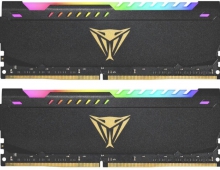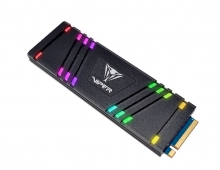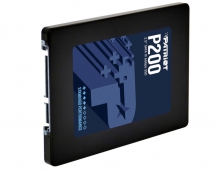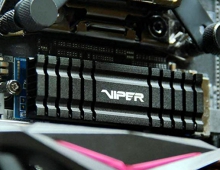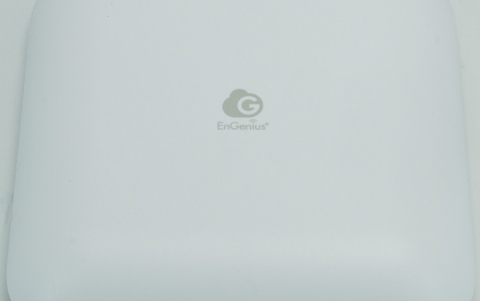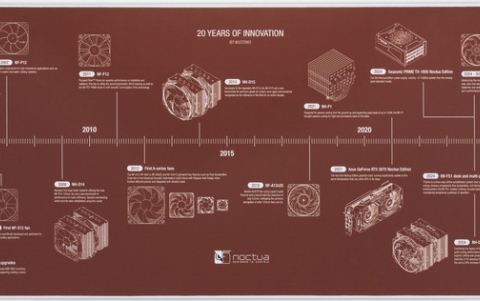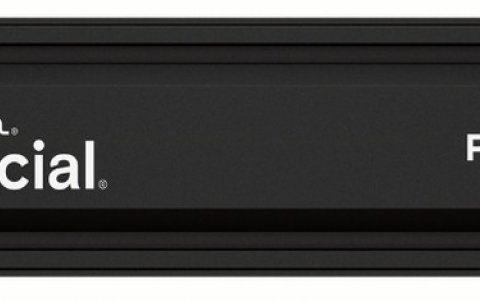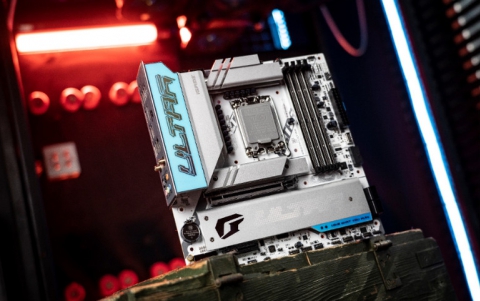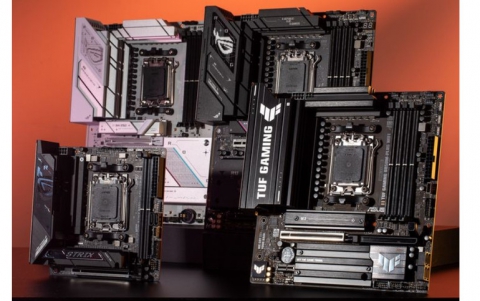Patriot Memory Inferno 100GB SSD review
3. Benchmarks
We tested the SSD in the following PC:
- CPU: Intel Core i7-920 Retail
- Motherboard: Asus P6T Deluxe BIOS 1904
- Memory: Crucial PC3-1066 3x1GB @ DDR3-1333 (CL7)
- Main HDD: Seagate 7200.12 500GB
- VGA: MSI 7600GT Silent
- Windows 7 x64 with all the latest updates installed
We didn't perform any kind of optimizations for the operating system since we didn't install the operating system in the Agility 2 SSD drive. We made sure that "enable advanced performance" feature was enabled (Control Panel-- Device Manager) before performing any test. We used the following benchmarking software with their default options:
- HDTachRW v3.0.1.0
- HD Tune v4.50 Pro
- Crystal DiskMark v3
- ATTO Disk Benchmark v2.46
- ASS SSD Benchmark 1.5xxx
- IOMeter v2006.07.27 with Xtreme Benchmark template
In order to get the maximum performance, we used the SATA mode from IDE to AHCI. In order to do that, you can simply use this reg file and after reboot, install Intel's RST v9.6.0.1014 that also support TRIM commands even if the drive isn't used in a RAID configuration. The system will work just fine with MS standard drivers, but users have reported a higher performance after installing the latest Intel 9.6 driver pack.
After installation, we run the CrystalDiskInfo utility software, which monitors the installed SDD. As you can see in the screenshot below, the Patriot Inferno 100GB SSD SSD 60GB SSD Ver.305A13F0 supports the S.M.A.R.T, 48-bit LBA, APM, NCQ and TRIM features:

We start the tests with the HDTachRW software. HD Tach is a low level hardware benchmark for random access read/write storage devices. The software measures the sequential read speed (at various points on the device), the random access speed and sequential write speed. We selected the full benchmark.
The software reported an average sequential write speed of 249.40 MB/sec, which was slightly affected by the slow writing of the first GB's as you can see in the graph below. Reading was linear at 243.70 MB/sec. That's lower than the promised sequential read and write speeds of 285MB/s and 275MB/s respectively.
The SATA2 port maxed out at 247.90 MB/sec (burst speed):

The HD Tune Pro software is also a utility we used to measure the drive's reading performance. Although not necessarily representative of real-world workloads, HD Tune's targeted tests give us a glimpse of each drive's raw capabilities. This time we got a 237.30MB/sec speed for sequential write , which is a little bit slower than what we the HDTachRW software showed previously:
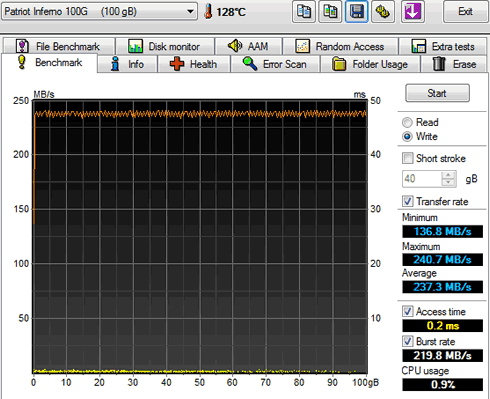
The random access read (and write) test is a very important performance area to look at on solid state drives as some controllers have problems with random writes.
The Patriot Inferno 100GB with the SandForce 1200 controller did it pretty well in the random write test. Below you can see the IOPs reported for different files:

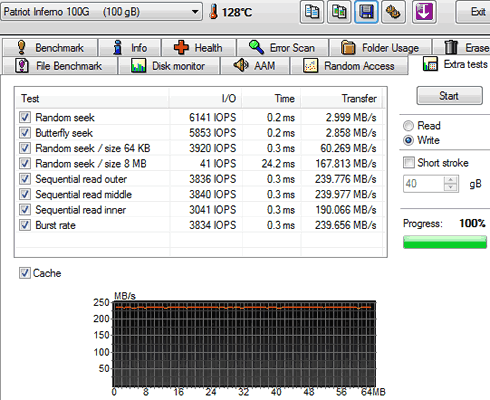
We also got very high speeds in the random read tests:

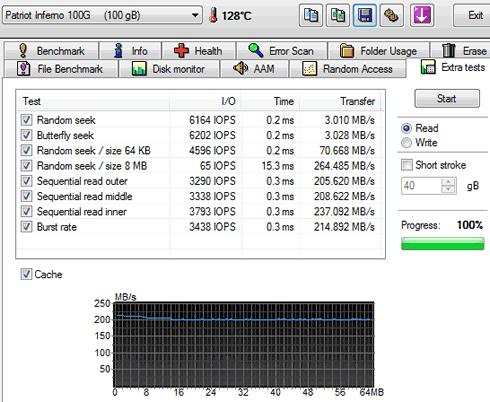
The next benchmark is the CrystalDiskMark. The software provides throughput data based on sequential reads and writes, and random (512K/4K/4KQD32) reads and writes. We've used the default 1,000MB file-size for the tests.
The software reported 216.50 MB/s for read and 140.3 MB/s for write (sequential). We also got 512K results of 206.4 MB/s read and 138.7 MB/s write performance. 4K tests produced 23.19 read and 93.84 write performance. 4KB queue depth 32 IOPS is one area where SandForce-based SSDs also excel, as you can see below:

The AS SSD Benchmark also provides sequential and random read/write tests, as well as other useful information about the drive's access times.
Beginning with sequential read and write performance, the Patriot Inferno Solid State Drive produced 208.39 MB/s read speed, and 131.67 MB/s write performance. The sequential file transfer speeds have traditionally been low with this benchmark tool.
Single-threaded 4K IOPS performance delivers 22.70 MB/s read and 78.44 MB/s write, which is among the highest results we've recorded. Similarly, the 64-thread 4K reads recorded 124.74 MB/s while write performance was 94.61MB/s.
The AS SSD Benchmark gave the drive a total score of 446:

The next software we used was the ATTO Disk Benchmark. The tool measures storage systems performance with various transfer sizes and test lengths for reads and writes.
The benchmark performs file transfers ranging from 0.5 KB to 8192 KB. It reported a very high performance rates at 276.737 MB/sec write and 284.963 MB/sec read, with Queue Depth 4 (default). These are very close to the speeds suggested by SandForce the specifications given by Patriot:

We proceed to the most important benchmark of the test, the IOMeter. Iometer is run by using workstation and database patterns for queue depths (outstanding I/Os) of two and 32, representing very light and moderate loads. Iometer is both a workload generator (that is, it performs I/O operations in order to stress the system) and a measurement tool (that is, it examines and records the performance of its I/O operations and their impact on the system). The app's ability to bombard drives with an escalating number of concurrent IO requests also does a nice job of simulating the sort of demanding multi-user environments that are common in enterprise applications. It can be used for measurement of the performance of an SSD. We run the IOMeter tests using the Xtreme Benchmark template . Here are the results:

Compared with previously tested SSDs, the PatriotMemory Inferno really breaks the records with 12842.52 IOPS, while the OCZ Agility 2 stays slightly behind with 10757.42 IOPS. The response times for the Patriot SSD are also very low, a very important important for a non-shuttering system:




